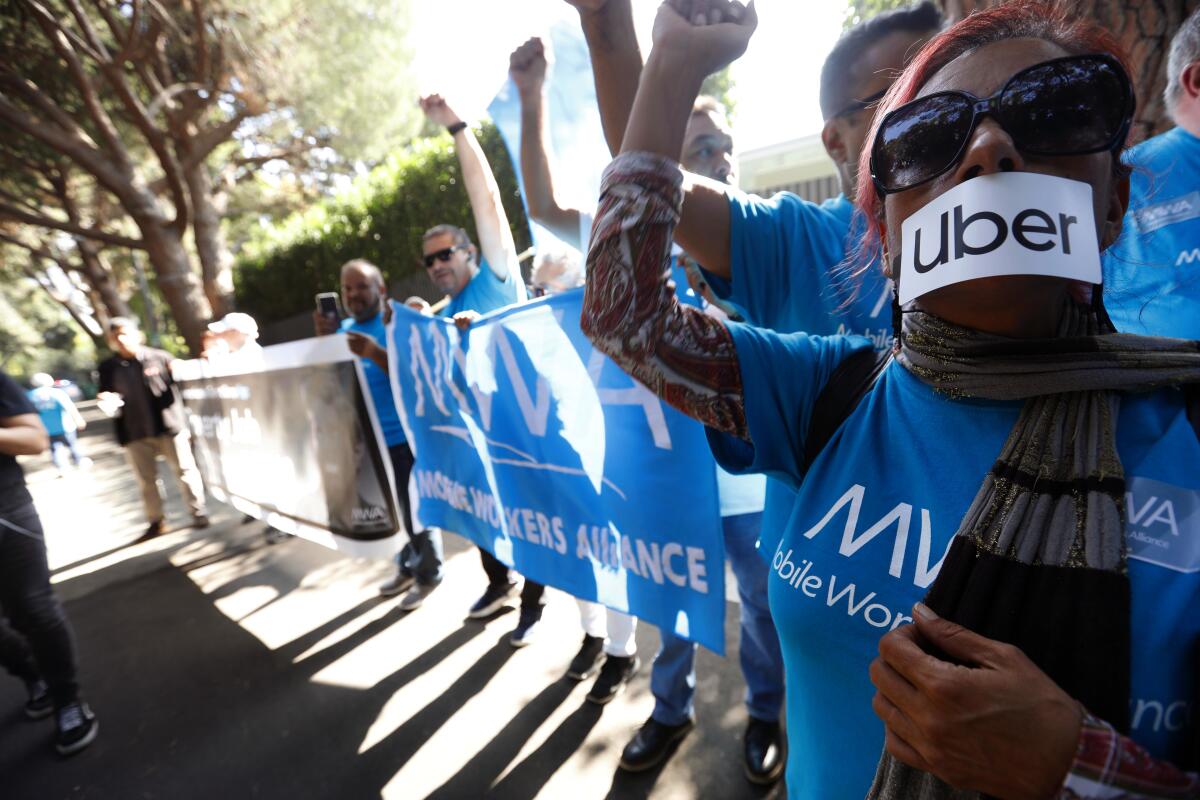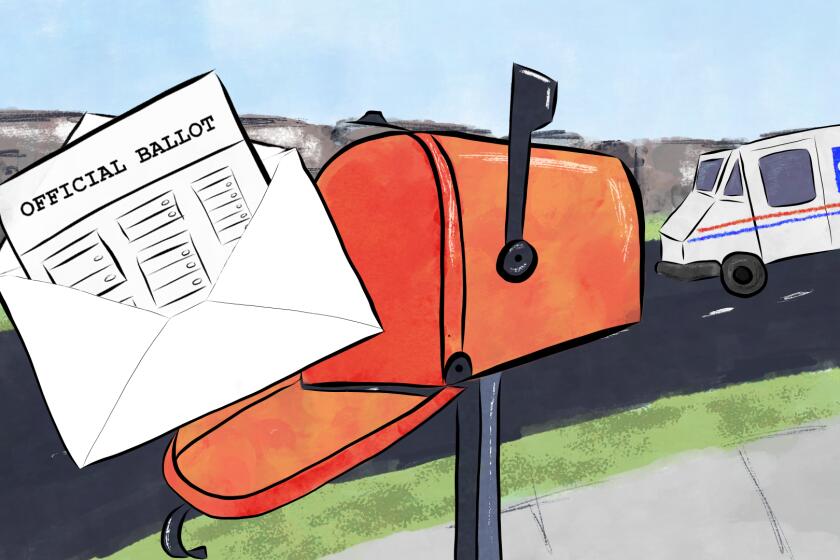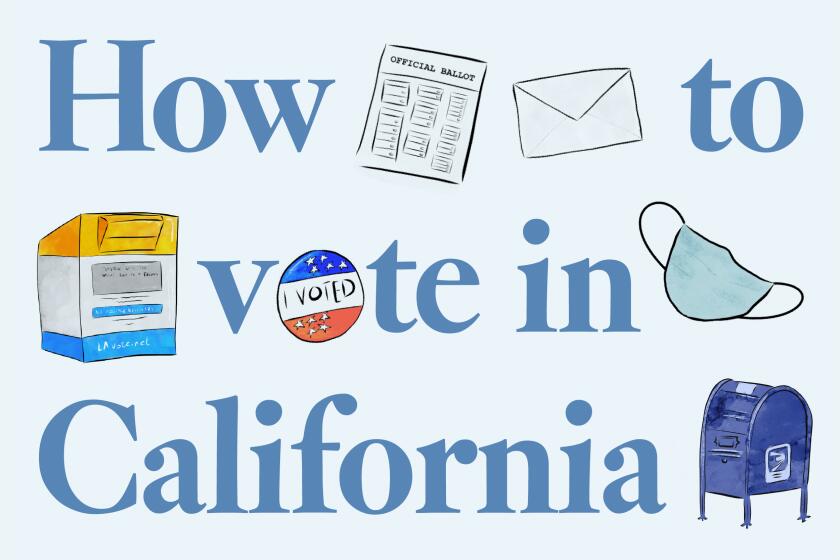New poll shows tight races for California propositions to change app-based driver rules, business property taxes

- Share via
SACRAMENTO — A new statewide poll finds a sharp decline in the number of voters undecided on Proposition 22, an effort to designate drivers who work for app-based companies as independent contractors, but provides no clear hint at the outcome as election day nears.
The poll also offers little certainty about Proposition 15, the plan to loosen California’s long-standing limits on commercial property taxes. A plurality of voters back both proposals in the poll released Monday by UC Berkeley’s Institute of Governmental Studies, but the lead is relatively narrow — and in the case of the tax increase, the level of support remains unchanged since last month.
“It looks close on both of them,” said Mark DiCamillo, the poll’s director. “Voters are deciding on these propositions late.”
The online poll of 5,352 likely voters found 46% said they would vote in favor of Proposition 22, while 42% would vote against it. The number of undecided voters fell by 13 percentage points since the institute’s mid-September poll as support and opposition grew in roughly equal amounts.
Support for Proposition 15, which would require a reassessment of higher-value commercial and industrial properties, remained the same — 49% — as it was in September. The level of opposition, however, rose to 42%. Fewer than 1 in 10 voters in the poll, which was conducted between Oct. 16 and 21, were undecided.
The survey results also suggest two other ballot measures are headed for defeat: Proposition 16, an effort to remove California’s ban on affirmative action policies, and Proposition 21, which would expand rent control to more communities.
In both contests, opposition has risen sharply since the UC Berkeley institute’s September poll: 49% of likely voters would now vote against Proposition 16, and only 38% would vote for it. Opposition to Proposition 21 has grown by 11 percentage points to 48% while support remained stagnant at 37% of those surveyed.
“Trend lines are really important for propositions,” DiCamillo said.
The four proposals are perhaps the most closely watched of the 12 propositions on the Nov. 3 ballot. Three of them — Propositions 15, 21 and 22 — are the focus of sprawling and expensive political battles.
The clash over Proposition 22 is the most expensive ballot measure campaign in state history, with current contributions topping $218 million. More than 90% of that has come from app-based companies seeking to rewrite the state’s worker classification law.
“The voters understand the stakes are enormous for the nearly 1 million drivers who need Prop. 22 to save their jobs and for the millions of California families who rely on app-based services for safe deliveries and transportation,” said Geoff Vetter, a spokesman for the campaign in support of the ballot measure.
The app-based companies are waging simultaneous fights in the courtroom and on the campaign trail. A state appeals court last week upheld an order for the companies to classify their drivers as employees, entitling gig-economy workers to an array of state-mandated benefits.
Proposition 22 would block that effort while providing a less generous package of benefits. Regardless of the election outcome, the business operations of the companies are likely to change.
Mike Roth, a spokesman for the labor-backed campaign against Proposition 22, accused the app-based companies of spending record amounts of money to finance a “barrage of threats and deceit” and said voters should focus on the extra pay and benefits drivers would receive as company employees.
“Prop. 22 doesn’t help ride-share drivers, it hurts them,” Roth said.
In Proposition 15, voters will decide whether to increase property taxes on commercial and industrial holdings valued at more than $3 million. Its passage would mark the most substantial revision to date of Proposition 13, California’s landmark rollback of property taxes approved by voters in 1978. Supporters outnumber opponents in the poll, but their ranks have not grown since September.
The Berkeley poll released Monday found evidence that a key accusation made by Proposition 15 opponents has gained traction with voters — namely, that the measure is a first step toward eventually rescinding Proposition 13’s homeowner property tax limits. The proposed constitutional amendment explicitly states it would not change residential property tax rules. But 56% of likely voters either somewhat or strongly agreed those changes could be on the horizon.
Among Proposition 15 opponents, 72% said they have some belief in that possibility.
“Proposition 13 is still very popular,” said Michael Bustamante, a spokesman for the campaign against Proposition 15, who also noted voters are skeptical that the new taxes will actually help schools. “Folks have grown weary of all these promises.”
Forty-eight percent of voters in the poll said they believe that schools and local governments need extra revenue as a result of the COVID-19 pandemic, an argument made by some Proposition 15 supporters. And 40% of undecided voters agreed, at some level, with that sentiment.
DiCamillo said Propositions 15 and 22 should not be written off, as voters inundated with news about the pandemic and the presidential contest have only now focused on ballot measures.
“I don’t think the past rules of thumb are necessarily as important this time,” he said about the two propositions. “Whatever decision voters make on these measures, it probably will not be by a large margin.”
The hill to climb is much steeper for Proposition 16, favored by fewer than 4 in 10 likely voters, which seeks to reinstate affirmative action programs in California. Placed on the ballot by the Legislature, it would repeal Proposition 209, a 1996 measure approved by voters prohibiting government bodies, including the UC and California State University systems, from granting preferential treatment to any individual or group based on race, sex, color, ethnicity or national origin. Proposition 16 would allow affirmative action efforts in public college admissions and government employment and contracting decisions.
DiCamillo noted that Latino voters were almost evenly split on the effort to reinstate affirmative action policies.
“That’s not a good sign for Prop. 16,” he said. “It would need much stronger support among Latinos.”
The poll found weak support for Proposition 21, which would expand rent control across California by allowing cities and counties to pass stricter limits on rents than under current state law. In 2018, voters decisively rejected a similar initiative. This year’s version would allow cities and counties to limit rents on apartments built more than 15 years ago, on some single-family home and condominium rentals and when new tenants move in — all of which is currently prohibited.
Like in 2018, total fundraising for the initiative has topped $100 million, with the campaign against Proposition 21 — predominately funded by large landlord interests including Essex Property Trust, Equity Residential and AvalonBay Communities — outraising supporters. Nearly all the money in favor of Proposition 21 comes from the Los Angeles-based AIDS Healthcare Foundation, which was also behind the 2018 initiative.
Times staff writers Liam Dillon and Phil Willon contributed to this report.
More to Read
Sign up for Essential California
The most important California stories and recommendations in your inbox every morning.
You may occasionally receive promotional content from the Los Angeles Times.













